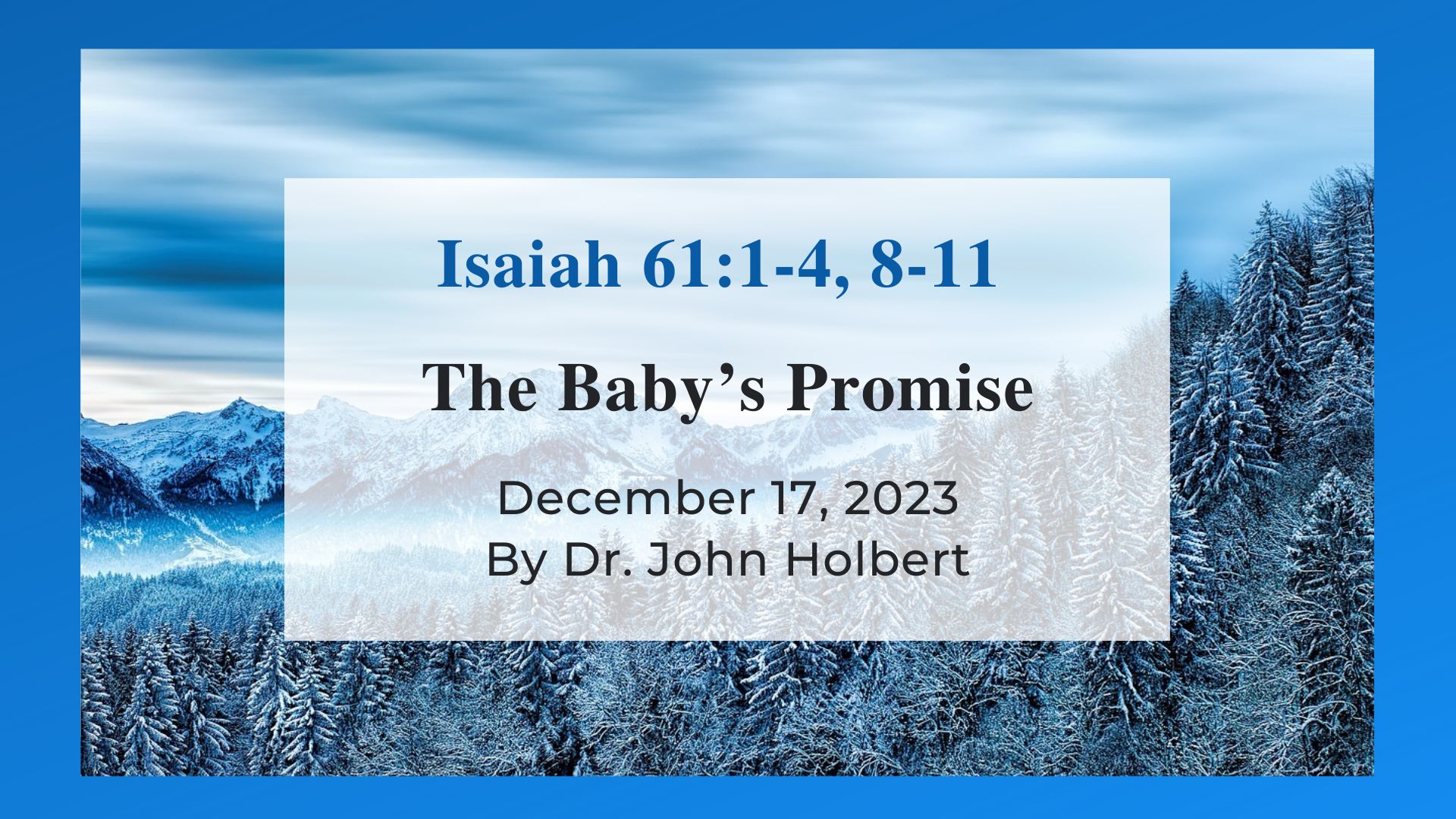The Baby’s Promise - Reflections on Isaiah 61:1-4, 8-11
by Dr. John Holbert on Monday, December 11, 2023

The Baby’s Promise
Isaiah 61:1-4, 8-11
The Peripatetic Hebrew Bible Preacher
We continue our look at the surprising baby for this Advent season. We may have thought we needed a God who “tears the skies” and comes down in ferocious wrath against our enemies, cleansing the world of them and leaving us, the faithful ones, as the true chosen of God. But, surprise, surprise! What we received instead was a peaceful shepherd, carrying silly lambs in divine arms, gently guiding those who are pregnant. But lest we imagine that this baby merely becomes “gentle Jesus, meek and mild,” today we are reminded that the baby of Christmas has a clear and decided message to offer, and it is summarized in Is.61:1-2:
“The Spirit of YHWH God is on me,
yes, YHWH has annointed me,
has sent me to bring good news to the oppressed,
to bind up those with shattered hearts,
To preach liberty to the captives,
and release to prisoners,
to preach the year of YHWH’s grace,
and the day of the zealous actions of our God;
to comfort all who mourn.”
To you too-exclusive New Testament readers, I trust those words will sound familiar. They are exactly—almost— the substance of Jesus of Nazareth’s inaugural sermon in his hometown of Nazareth, as recorded in Luke 4. As a result of this sermon for his friends and family, he is nearly murdered, almost thrown off the highest point of the city. Somehow, mysteriously, he escapes to preach another day.
I said that the Lukan sermon was “almost” the words of Is.61:1-2, but a significant line of Isaiah is missing from Luke’s rendition. Nowhere in Luke do we read that Jesus’s sermon included the announcement of “the day of the zealous actions of our God.” NRSV translates the line: “the day of vengeance of our God.” The implication of the Hebrew word here is God’s own vindication against the world’s wrongs, God’s willingness to right the wrongs the world presents. That is, the sharp actions of the one chosen, unnamed in Isaiah, manifest in Jesus, the binding of the wounded, the freeing of prisoners, the comforting of the mourners, are manifestations of YHWH’s determination to set things right. It is not so much a “getting even,” as our understanding of “vengeance” might be, but a desire to return things to the ways God had intended them from the foundations of the world. Though Luke does not quote the line concerning the “zealous actions of God,” he states plainly that the coming actions of that God intend to do exactly that, namely change the world toward the good.
And the certainty of this promise is made plain in a beautiful cascade of metaphors at the end of the passage.
“Just as the earth bursts forth with its shoots;
just as a garden causes its plantings to spring up,
So will YHWH God cause a praise-filled righteousness to rise up
in the face of all nations.”
I translate NRSV’s double noun, “righteousness and praise” as “praise-filled righteousness,” using the two joined nouns as hendiadys, one noun modifying the other, as one often finds in Hebrew. The chosen servant, for Christians the baby Jesus, will grow up to proclaim the full and active work of YHWH, the work of justice and peace, the work of righteousness for all people, peppered with praise of the God who asks it of us. This means that the work of righteousness is itself the praise of YHWH. In the call of this God, we hear that our actions toward even the “least of these” (Mt.25), are themselves the praise of God.
As we approach the 4th Sunday of Advent, we may now see more clearly just who this tiny baby is and who he will become. Seen in the light of these three Hebrew Bible texts from Isaiah—Is.64, 40, and 61—the expectation of the Christmas baby surprise assumes a sharper focus and serves to make the coming of the child the astonishing wonder that it can be for us this and every year. But next week, we will hear from an unlikely source that if we choose to do the justice work of God, we would do well to be careful and examine ourselves before attempting such work.
